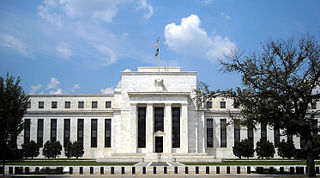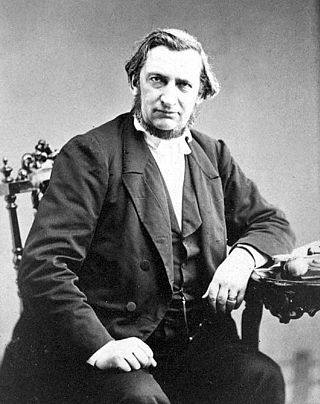A currency is a standardization of money in any form, in use or circulation as a medium of exchange, for example banknotes and coins. A more general definition is that a currency is a system of money in common use within a specific environment over time, especially for people in a nation state. Under this definition, the British Pound sterling (£), euros (€), Japanese yen (¥), and U.S. dollars (US$) are examples of (government-issued) fiat currencies. Currencies may act as stores of value and be traded between nations in foreign exchange markets, which determine the relative values of the different currencies. Currencies in this sense are either chosen by users or decreed by governments, and each type has limited boundaries of acceptance; i.e., legal tender laws may require a particular unit of account for payments to government agencies.

A central bank, reserve bank, national bank, or monetary authority is an institution that manages the currency and monetary policy of a country or monetary union. In contrast to a commercial bank, a central bank possesses a monopoly on increasing the monetary base. Many central banks also have supervisory or regulatory powers to ensure the stability of commercial banks in their jurisdiction, to prevent bank runs, and in some cases also to enforce policies on financial consumer protection and against bank fraud, money laundering, or terrorism financing.

The krona is the currency of the Kingdom of Sweden. It is one of the currencies of the European Union. Both the ISO code "SEK" and currency sign "kr" are in common use for the krona; the former precedes or follows the value, the latter usually follows it but, especially in the past, it sometimes preceded the value. In English, the currency is sometimes referred to as the Swedish crown, as krona means "crown" in Swedish. The Swedish krona was the ninth-most traded currency in the world by value in April 2016.
An interest rate is the amount of interest due per period, as a proportion of the amount lent, deposited, or borrowed. The total interest on an amount lent or borrowed depends on the principal sum, the interest rate, the compounding frequency, and the length of time over which it is lent, deposited, or borrowed.

The monetary policy of The United States is the set of policies which the Federal Reserve follows to achieve its twin objectives of high employment and stable inflation.

His Majesty's Treasury, occasionally referred to as the Exchequer, or more informally the Treasury, is a ministerial department of the Government of the United Kingdom. It is responsible for developing and executing the government's public finance policy and economic policy. The Treasury maintains the Online System for Central Accounting and Reporting, the replacement for the Combined Online Information System, which itemises departmental spending under thousands of category headings, and from which the Whole of Government Accounts annual financial statements are produced.

The svenska riksdaler was the name of a Swedish coin first minted in 1604. Between 1777 and 1873, it was the currency of Sweden. The daler, like the dollar, was named after the German Thaler. The similarly named Reichsthaler, rijksdaalder, and rigsdaler were used in Germany and Austria-Hungary, the Netherlands, and Denmark-Norway, respectively. Riksdaler is still used as a colloquial term for krona, Sweden's modern-day currency.
The money market is a component of the economy that provides short-term funds. The money market deals in short-term loans, generally for a period of a year or less.

Fractional-reserve banking is the system of banking in all countries worldwide, under which banks that take deposits from the public keep only part of their deposit liabilities in liquid assets as a reserve, typically lending the remainder to borrowers. Bank reserves are held as cash in the bank or as balances in the bank's account at the central bank. Fractional-reserve banking differs from the hypothetical alternative model, full-reserve banking, in which banks would keep all depositor funds on hand as reserves.

The Bank of Korea is the central bank of the Republic of Korea and issuer of South Korean won. It was established on 12 June 1950 in Seoul, South Korea.

Leif Pagrotsky is a Swedish politician, economist, and diplomat. He served as Minister of Culture from 2004 to 2006 and Minister for Business and Industry from 2002 to 2004 under Prime Minister Göran Persson. After this, he held the position of Consul General of Sweden in New York City from 2016 to 2018.

Stockholms Banco was the first European bank to print banknotes. It was founded in 1657 by Johan Palmstruch in Stockholm, began printing banknotes in 1661, but ran into financial difficulties and was liquidated in 1667. Stockholms Banco was the immediate precursor to the central bank of Sweden, founded in 1668 as Riksens Ständers Bank and renamed in 1866 as Sveriges Riksbank, which is the world's oldest surviving central bank.
Monetization is, broadly speaking, the process of converting something into money. The term has a broad range of uses. In banking, the term refers to the process of converting or establishing something into legal tender. While it usually refers to the coining of currency or the printing of banknotes by central banks, it may also take the form of a promissory currency. The term "monetization" may also be used informally to refer to exchanging possessions for cash or cash equivalents, including selling a security interest, charging fees for something that used to be free, or attempting to make money on goods or services that were previously unprofitable or had been considered to have the potential to earn profits. And data monetization refers to a spectrum of ways information assets can be converted into economic value.

Money is any item or verifiable record that is generally accepted as payment for goods and services and repayment of debts, such as taxes, in a particular country or socio-economic context. The primary functions which distinguish money are: medium of exchange, a unit of account, a store of value and sometimes, a standard of deferred payment.

Sveriges Riksbank, or simply the Riksbank, is the central bank of Sweden. Founded in 1668, it is the world's oldest surviving central bank, and the third oldest bank in continuous operation. Until the 20th century, it was also the only state-owned central bank outside of the Russian Empire.
The Swedish Fortifications Agency is a Swedish government agency under the Ministry of Finance, tasked with managing government-owned defence-related buildings and land. The agency functions as the landlord for the Swedish Armed Forces, managing various types of military installations. The SFA is one of the largest holders of real estate in Sweden.
The Swedish National Financial Management Authority is a central administrative government agency in Sweden responsible for economic financial management, analyses and economic forecasting for central government agencies. The entity operates under the Ministry of Finance. The agency consists of seven departments:

André Oscar Wallenberg was a Swedish banker, industrialist, naval officer, newspaper tycoon, politician and a patriarch of the Wallenberg family. In 1856 Wallenberg founded the Stockholms Enskilda Bank, the predecessor of today's Skandinaviska Enskilda Banken.

Lars Johan Heikensten is a former governor of Sveriges Riksbank and Doctor of Economics.

Karolina Ekholm is a Swedish economist and public official.














